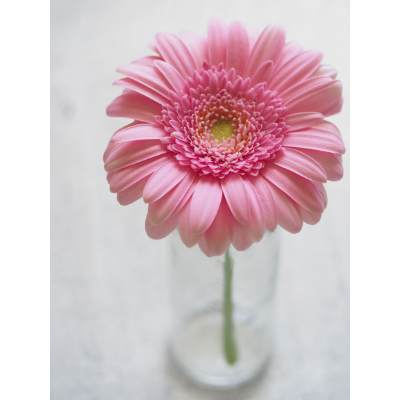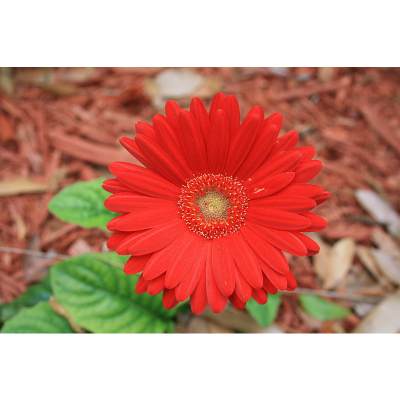For my Gerbera flowers, I always use a slow-release plant food, like Schultz fertilizer with has 15-5-15 NPK formula. Follow the directions on the package or fertilize them every two to four weeks for the best results. This gives them the best necessary nutrients and makes sure they have lots of beautiful flowers.
Few blossoms in your yard can compare to the allure of Gerbera daisies when it comes to floral splendor. Bright and cheery, these flowers will provide a touch of sunlight to any outdoor area. However, a well-thought-out fertilization plan is essential to allowing them to actually develop and enjoy their breathtaking beauty. I’ll be your guide in this post while you look for the finest fertilizer for Gerbera daisy plants. We’ll go deeply into natural, organic, handmade, and NPK-based fertilizers, discovering the tricks to perfectly tend to these flowers.
Gerbera Daisy Fertilization: A Crucial Necessity
Prior to getting into the intricacies of fertilizers, let’s examine the reasons why Gerbera daisies need fertilizing. Consider your Gerberas as runners getting ready for a long run. These delicate flowers need nourishment to surprise you with their vivid colors and many blooms, just as runners need proper nutrition to perform at their best. They may perish without the right nutrition, much like an athlete running on empty.
In order to keep Gerbera daisies looking their best and guaranteeing that they will bloom profusely, proper fertilizing is necessary. I suggest fertilizing these lovely blooms with a properly calibrated technique to do this.
1. Choosing the Right Fertilizer
Making the proper fertilizer choice is the first step to a successful Gerbera daisy plant. To encourage blooming rather than excessive leaf growth, it is important to choose a water-soluble fertilizer with precise N-P-K (Nitrogen-Phosphorus-Potassium) ratios. Solutions such as 15-5-15 are good because they provide the nutrients needed and reduce the chance of encouraging too much foliage at the price of blooms.
Table of Contents
Best fertilizer for Gerbera daisy – Shop from Amazon

2. Timing is Everything
Your Gerbera daisies will get a steady supply of nutrients to support their development and blooming cycles if you apply fertilizer in this way. Gerberas don’t always bloom, so keep that in mind. They go through bloom cycles, then take a quick two-week hiatus to “refuel” before they begin to bloom once again. This natural cycle emphasizes how crucial consistent and well-balanced fertilization is.
3. The Controlled-Release Fertilizer Option
Those looking for a hassle-free method may want to think about applying controlled-release fertilizers. These are an easy method to provide your Gerbera daisies a consistent source of nutrients; you may apply them two or three times throughout the growth season. For optimal results, please follow the product directions.
4. Beware of Over-Fertilization
Remember that overfertilizing may cause a buildup of salt in the soil, which can be detrimental to your plants. Thus, it’s critical to find equilibrium and steer clear of overfertilization.
Also Read :
Do Gerbera Daisies Come Back Every Year? (Perennials or Annuals)
Are Gerbera Daisies Annuals or Perennials – Keep it Blooming?
How to Grow, Plant and Care for the Shasta Daisy
When to Plant Shasta Daisy Seeds – Growing And Caring Guide
April Birth Flowers: Daisy And Sweet Pea (Meanings)
Homemade Fertilizers: Nurturing Gerbera Daisies from Your Kitchen
Homemade fertilizers are like a lovingly prepared home-cooked meal for your Gerbera daisies. They may not come with a fancy label, but they pack a punch of nutrients. Let’s explore some DIY options.
1. Banana Peel Elixir
Nutrient-rich banana peels are a hidden gold mine, particularly potassium, which is essential for floral growth. All you have to do to make this elixir is soak banana peels in water for a few days. Pour some of this “banana tea” over your Gerberas. This is a natural method of increasing their potassium intake.
2. Epsom Salt Solution
Magnesium is an essential component for plant health and is included in epsom salt. Once a month, use a tablespoon of Epsom salt dissolved in one gallon of water to water your Gerbera daisies. This will improve their general health.
3. Eggshell Powder
Eggshells are a great source of calcium, which is necessary for robust cell walls and resistance to illness. Finely grind desiccated eggshells and scatter them around the base of your Gerbera daisies. They will stand tall and healthy thanks to this natural vitamin.

Natural Fertilizers: Mother Nature’s Bounty
Nature has its way of providing for its children, and Gerbera daisies are no exception. Let’s explore some natural fertilizers that align perfectly with these vibrant blooms.
1. Compost: Black Gold for Your Garden
The greatest friend of a gardener is compost, and Gerbera daisies love it. Compost is a naturally occurring fertilizer that is high in organic matter and abundant in nutrients, which helps to enhance soil structure and encourage microbial activity. Compost may be used as a top dressing for Gerbera plants or incorporated into the soil of your garden.
2. Fish Emulsion: A Seafood Feast
Made from fish wastes, fish emulsion is a nutrient-rich liquid fertilizer. It’s an excellent provider of micronutrients and nitrogen. Apply a diluted solution, following the directions on the container, to your Gerbera daisies throughout the growth season. They’ll express their gratitude to you with an amazing bouquet.
3. Seaweed Extract: Ocean’s Gift
For your Gerberas, seaweed extract is yet another amazing natural remedy. Rich in growth hormones and vital minerals, it promotes healthy root growth and general plant health. Use it as a root drench or foliar spray by mixing it with water.
Organic Fertilizers: Nurturing with Care
If you’re committed to organic gardening practices, you’ll be pleased to know that there are organic fertilizers tailored to Gerbera daisies.
1. Worm Castings: Nature’s Black Gold
The gardening world’s equivalent of black gold is worm castings. These nutrient-rich earthworm leftovers are brimming with vital nutrients and healthy microbes. Your Gerbera daisies will flourish if you scatter a bunch around their base.
2. Bone Meal: Boosting Blooms
Phosphorus is essential for the growth of flowers, and bone meal is a great supply of it. Made from finely powdered animal bones, it’s an organic fertilizer. To make sure your Gerbera plants receive the phosphorus they need for many blooms, work it into the soil before planting.
3. Bat Guano: Nature’s Nitrogen Boost
Bat excrement, also known as guano, is a rich supply of nitrogen that is necessary for healthy, vibrant development and luxuriant vegetation. It comes in a variety of formulas to meet the demands of different plants. Apply it as a top dressing or create a foliar spray rich in nutrients by combining it with water.
The NPK Approach: Decoding the Numbers
The world of fertilizers can sometimes feel like deciphering a secret code, especially when it comes to those three mysterious numbers on the label. Let’s break down the N-P-K ratios and their significance for Gerbera daisies.
1. Nitrogen (N) – Fuel for Growth
The first number, nitrogen, is like the gasoline that keeps your Gerbera daisies growing. It is in charge of the luxuriant foliage and general vitality. But too much nitrogen might cause plants to generate too many leaves at the price of blossoms. Thus, it’s essential to use a balanced fertilizer with a reduced nitrogen concentration.
2. Phosphorus (P) – Blooming Brilliance
The second quantity, phosphorus, is essential for brilliant flowers. It promotes the growth of roots and flowers. A greater phosphorus concentration is ideal for Gerbera daisies, but not at the price of other nutrients.
3. Potassium (K) – Building Resilience
The third element, potassium, is important for strengthening your Gerbera daisies. It improves general plant hardiness, root growth, and disease resistance. Potassium has to be present in just the right quantity for these blooms to flourish.
The Organic vs. Synthetic Dilemma: What’s Best for Gerbera Daisies?
When it comes to choosing between organic and synthetic fertilizers, it’s not a question of one being better than the other. Rather, it’s a matter of aligning your gardening philosophy with your preferences and values.
Organic Fertilizers
As we have already covered, organic fertilizers come from natural sources. They support beneficial microbes, improve soil health, and support environmentally friendly farming techniques. You may be confident that you are feeding your Gerbera daisies and supporting the ecology under the soil when you use organic fertilizers.
Synthetic Fertilizers
Conversely, artificial or synthetic fertilizers are designed to provide certain nutritional profiles. They provide exact control over the distribution of nutrients and are easily accessible. They may, however, sometimes result in nutritional imbalances and damage beneficial soil species.
Your gardening ideals and aims will ultimately determine whether you use synthetic or organic fertilizers. While some gardeners appreciate the holistic approach of organic gardening, others choose the ease of use and instant gratification of synthetic fertilizers.
Fertilization Tips and Tricks
As we approach the conclusion of our Gerbera daisy fertilization journey, here are some additional tips and tricks to ensure your blooms reach their full potential:
1. Watering Matters
Recall that fertilizing is not as important as watering. Gerbera daisies don’t like to stand in soggy soil; instead, they demand steady wetness. Make sure your plants have enough drainage, and water them when the top inch of soil feels dry.
2. Deadheading for Continuous Blooms
Don’t forget to deadhead your Gerbera daisies to promote ongoing blooming. This calls for the quick removal of wasted flowers. This method diverts the plant’s energy from seed-setting to the production of new blooms.
3. Sunlight Requirements
Gerbera daisies may grow in either full sun or little shade. For optimal effects, make sure they get at least six hours of sunshine each day.
4. Mulching for Soil Health
Mulching the area around your Gerbera daisies’ base can help keep the soil wet, control temperature, and inhibit the development of weeds. Wood chips and straw are good examples of organic mulches.
Conclusion: A Flourishing Garden of Gerbera Daisies
I hope you find this article “Best Fertilizer for Gerbera Daisy” helpful. Growing Gerbera daisies is like creating a picture with the brilliant hues of nature, in the big scheme of gardening. The right fertilizer is essential to helping them reach their maximum potential. The aim is always the same: a garden full of the bright beauty of Gerbera daisies, whether you choose to use synthetic fertilizers for accuracy, make your own elixirs, or embrace the abundance of nature with natural and organic fertilizers.
Recall the fundamental principle of fertilization: equilibrium. Plants that get the proper nutrients at the appropriate times will be healthy and produce an amazing show of blossoms. Take a walk in your yard, enjoy the beauty of your Gerbera daisies, and remember that you are the one who holds the key to their growing beauty. Happy horticulture!
© 2024 Lotusmagus.com. All rights reserved. This content is protected by copyright. Visit Lotusmagus.com for more information.

